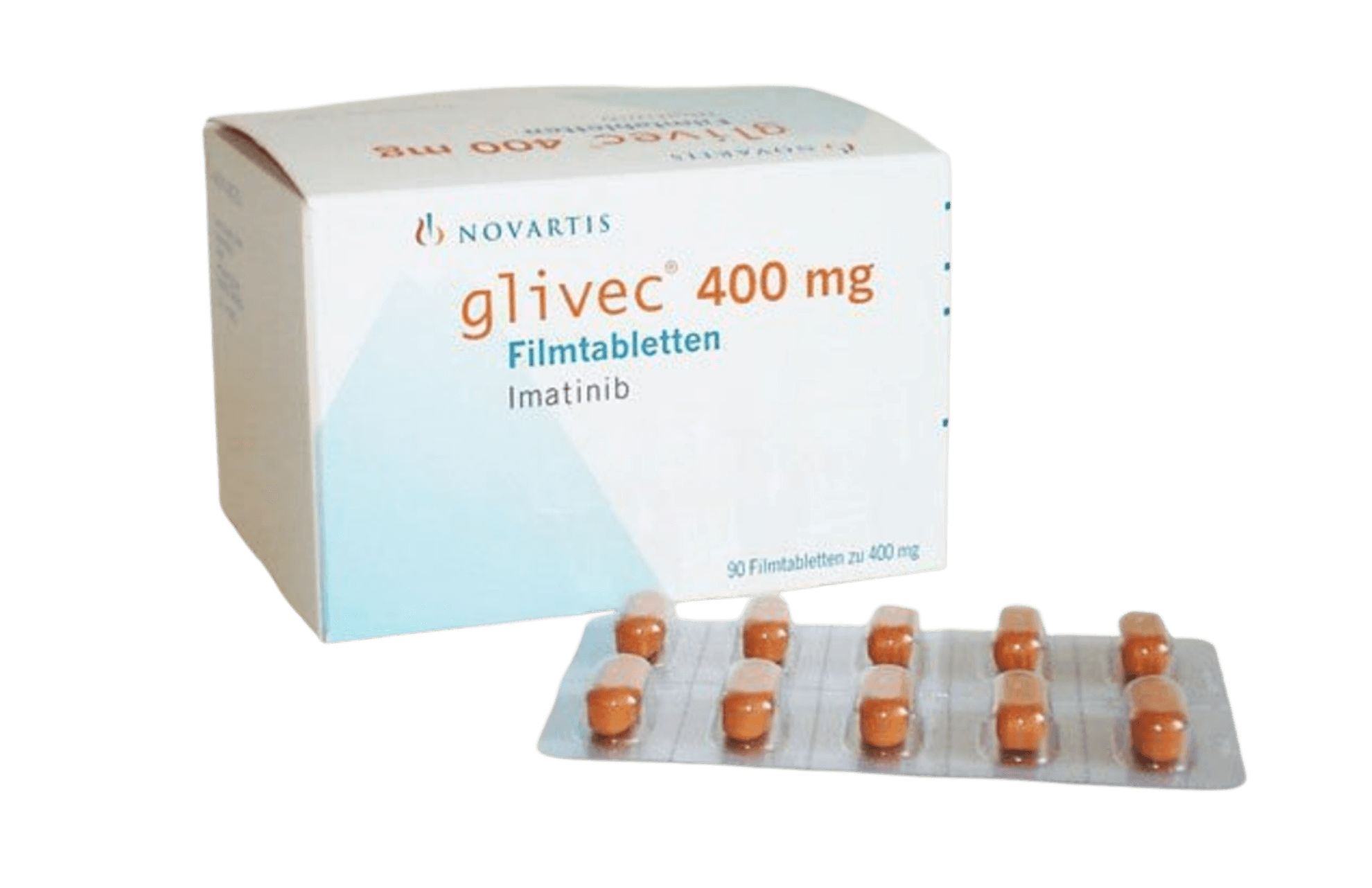Gilvec /
Gleevec (
generic name: imatinib) is a targeted cancer medication known as a
tyrosine kinase inhibitor (
TKI). It is used to treat a range of blood cancers and tumours by blocking the action of abnormal proteins that cause cancer cells to grow. Unlike traditional chemotherapy, which affects many types of cells, Gilvec works more selectively, focusing on the exact pathway that drives the cancer.
The medicine is approved for treating several conditions. These include:
- Chronic myeloid leukaemia (CML) in adults and children
- Acute lymphoblastic leukaemia (ALL) that is Philadelphia chromosome-positive (Ph+)
- Gastrointestinal stromal tumours (GIST
- Dermatofibrosarcoma protuberans (DFSP).
It also treats certain rare disorders such as hypereosinophilic syndrome (HES), chronic eosinophilic leukaemia, and some forms of myelodysplastic/myeloproliferative diseases.
Imatinib works by inhibiting a protein that signals cancer cells to grow and divide. This protein is overactive in patients with the Philadelphia chromosome, a genetic mutation commonly associated with certain types of blood cancer. By switching off this growth signal, the medicine slows the disease and helps restore blood counts to normal levels.
Gilvec was one of the first targeted cancer treatments and marked a turning point in how certain cancers are managed. Today, it is widely used worldwide and is included on the
World Health Organization’s List of Essential Medicines. It is well studied and has been shown to improve long-term outcomes for many patients.
Caution:
Unless specifically prescribed, Gilvec should not be taken by preganant or breastfeeding women. Contraception is necessary while taking the medication, and if there are indications of pregnancy, consult a healthcare provider immediately.
Dosage
Follow the instructions printed on the box label. Gilvec is usually taken by mouth once daily,
with a meal and a full glass of water.
For adult
CML in the chronic phase, the standard dose is 400 mg per day. In later stages of leukemia or GIST, doses may increase to 600 mg or 800 mg daily. A daily dose of 800 mg is usually split into 400 mg twice a day. Tablets should be swallowed whole. If swallowing is difficult, tablets can be dissolved in water or apple juice and consumed immediately.
If a dose is missed, take it as soon as you remember. However, if it is almost time to take the next dose, do not take the forgotten dose.
Continue taking the medicine as per the normal schedule. Do not take a double dose to make up for it.
Do not stop taking Gilvec without first consulting a doctor. Treatment usually continues until the doctor determines that the disease is controlled and the side effects are manageable.
Storage
Gilvec tablets should be stored at room temperature, below 25°C (77°F), in their original container to protect them from moisture.
Get more advice about safe drug storage.
This text is for informational purposes only. Please consult a doctor or pharmacist before using any medication.
Read the information leaflet that comes with the medication.
Most people who use Glivec do not experience any adverse side effects. Doctors prescribe this medication because they assess the benefits of such treatment outweigh any likely unwanted effects.
Some of the side effects that have been reported include tiredness, nausea, diarrhoea, muscle or bone pain, rash, or swelling in hands or feet. Severe but rare effects may include rapid weight gain, signs of infection such as: fever, severe chills, sore throat or mouth ulcers, serious fluid retention, heart problems, extreme bleeding, liver failure, or allergic skin reactions. Refer to a healthcare provider immeditaely if any of these effects are noticed.
Not all side effects are listed here. If these or other unlisted symptoms persist or worsen, consult a healthcare provider or pharmacist.
Glivec / Gleevec is indicated for the treatment of:
-
Chronic myeloid leukaemia (CML)
Gilvec is used to treat CML that carries the Philadelphia chromosome in adults and children over two years old. Symptoms include tiredness, weight loss, fever, and high white blood cell counts. It slows the disease and improves blood counts over time.
-
Philadelphia‑positive acute lymphoblastic leukaemia (Ph+ ALL)
Used in adults and children with this form of leukaemia, often alongside standard chemotherapy. Helps reduce disease progression and symptoms such as frequent infections and fatigues.
-
GIST and DFSP
Gilvec treats GIST (tumours in the gut) and DFSP (skin tissue tumours) in adults where surgery is not suitable. Symptoms include stomach pain or skin lumps. It helps reduce or stabilise tumour growth.
-
Other rare blood disorders
Includes certain myelodysplastic/myeloproliferative diseases, hypereosinophilic syndrome, and chronic eosinophilic leukaemia that involve gene changes. Gilvec helps control high cell counts and related symptoms like fatigue and itching.










